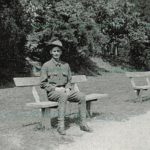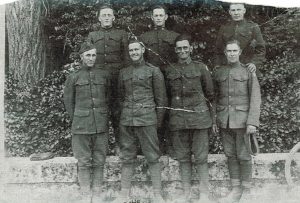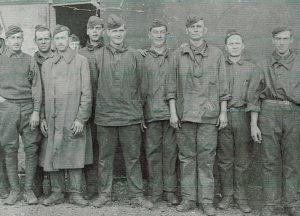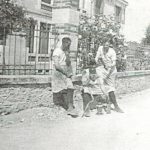allied soldiers

 When the United States entered World War I, they sent men into France to join Allied forces there. Their arrival was a great relief to the exhausted Allied soldiers. Before long the American soldiers in France became known as Doughboys. This was not an unknown term, since it had been used For centuries to describe such soldiers as Horatio Nelson’s sailors and Wellington’s soldiers in Spain, for instance. Both of these groups were familiar with fried flour dumplings called doughboys, the predecessor of the modern doughnut that both we and the Doughboys of World War I came to love. The American Doughboys were the men America sent to France in the Great War, who beat Kaiser Bill and fought to make the world safe for Democracy.
When the United States entered World War I, they sent men into France to join Allied forces there. Their arrival was a great relief to the exhausted Allied soldiers. Before long the American soldiers in France became known as Doughboys. This was not an unknown term, since it had been used For centuries to describe such soldiers as Horatio Nelson’s sailors and Wellington’s soldiers in Spain, for instance. Both of these groups were familiar with fried flour dumplings called doughboys, the predecessor of the modern doughnut that both we and the Doughboys of World War I came to love. The American Doughboys were the men America sent to France in the Great War, who beat Kaiser Bill and fought to make the world safe for Democracy.
It is thought, however, that the Doughboys of World War I might have acquired the name in a slightly different way. In fact, there are a variety of theories about the origins of the nickname. One explanation is that the term dates back to the Mexican War of 1846 to 1848, when American infantrymen made long treks over dusty terrain, giving them the appearance of being covered in flour, or dough. As a variation of this account goes, the men were coated in the dust of adobe soil and as a result were called “adobes,” which morphed into “dobies” and, eventually into “doughboys.” Among other theories, according to “War Slang” by Paul Dickson, American journalist and lexicographer H.L. Mencken claimed the nickname could be traced to Continental Army soldiers who kept the piping on their uniforms white through the application of clay. When the troops got rained on the clay on their uniforms turned into “doughy blobs,” supposedly leading to the doughboy moniker.
Whatever the case may be, doughboy was just one of the nicknames given to those who fought in the Great War. For example, “poilu” meaning “hairy one” was a term for a French soldier, as a number of them had beards or mustaches, while a popular slang term for a British soldier was “Tommy,” an abbreviation of Tommy Atkins, a generic name similar to John Doe used in the Unites States on government forms. America’s last 
 World War I doughboy, Frank Buckles, died in 2011 in West Virginia at age 110. Buckles enlisted in the Army at age 16 in August 1917, four months after the United States entered the conflict, and drove military vehicles in France. One of 4.7 million Americans who served in the war, Buckles was buried at Arlington National Cemetery. It’s strange to think that my grandfather, George Byer was one of the men called doughboys, but then he was stationed in France at that time in history, so I guess that Grandpa was a doughboy.
World War I doughboy, Frank Buckles, died in 2011 in West Virginia at age 110. Buckles enlisted in the Army at age 16 in August 1917, four months after the United States entered the conflict, and drove military vehicles in France. One of 4.7 million Americans who served in the war, Buckles was buried at Arlington National Cemetery. It’s strange to think that my grandfather, George Byer was one of the men called doughboys, but then he was stationed in France at that time in history, so I guess that Grandpa was a doughboy.

